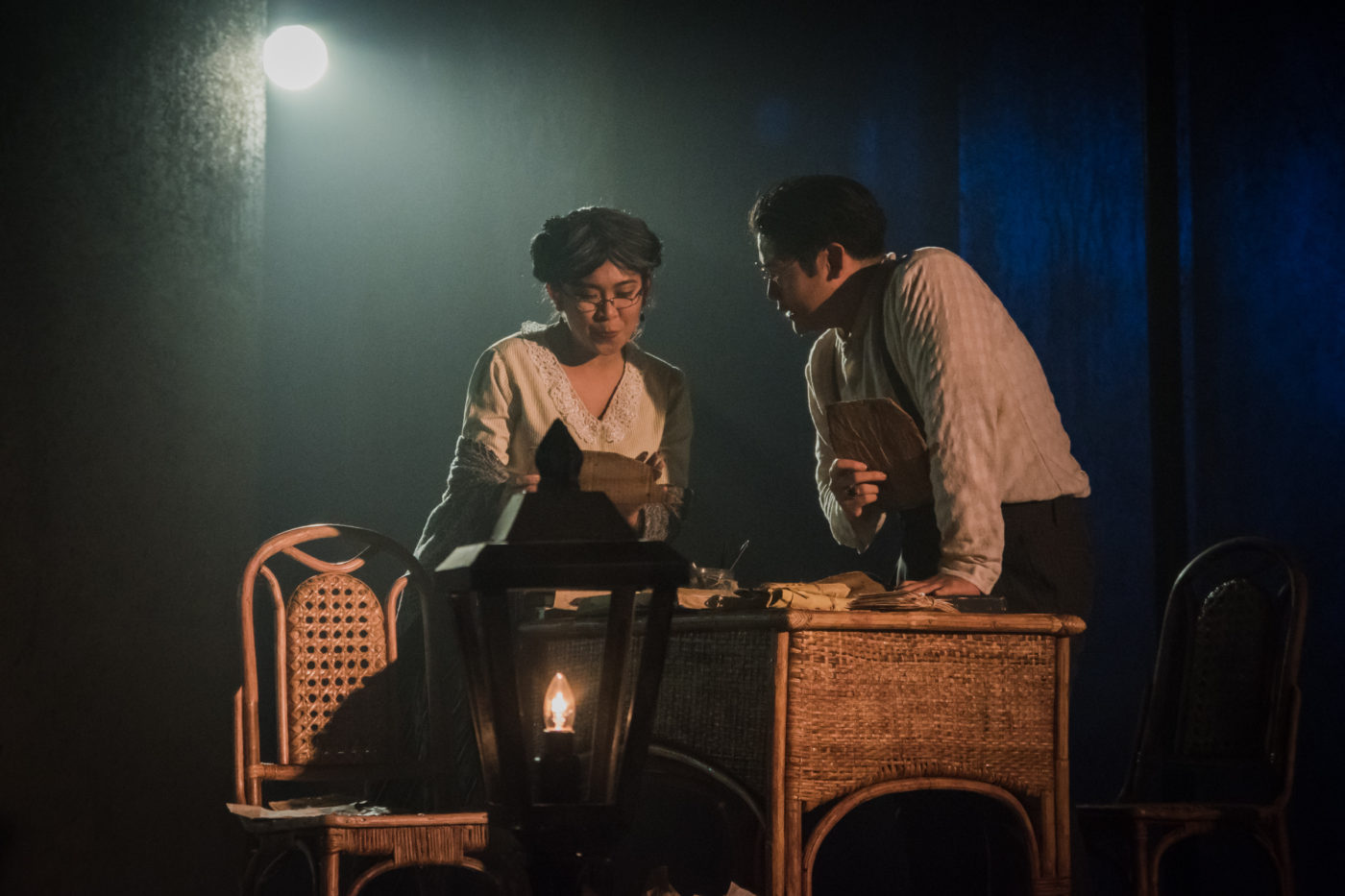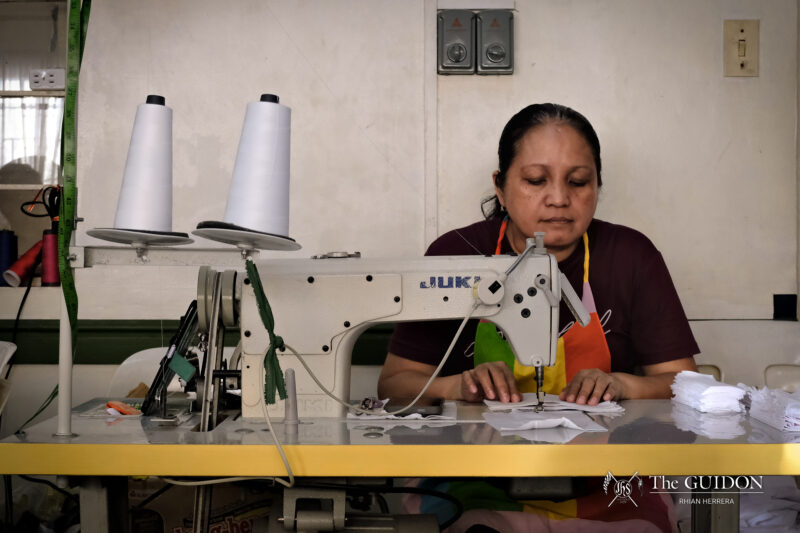Although most people associate the theater scene solely with excessive acting and grand musical numbers, local theater is no stranger to plays carrying political undertones. More often than not, these productions are staged at a time when political contention is abuzz, effectively delivering timely messages that invoke reflection and discourse, especially among the youth.
Two such plays have recently shed light on Philippine history and have lent themselves to political interpretation and discourse. Philippine Educational Theater Association (PETA) ran 3 Stars and a Sun, a dystopian rap musical from February 4 to March 6, at the PETA Theater, New Manila. Tanghalang Ateneo likewise staged its 37th season closer, Kalantiaw, at the Rizal Mini Theater in Ateneo de Manila University (AdMU) on several dates from March 30 through April 16.
In the political scene, on the other hand, the spotlight was on vice presidential candidate Ferdinand “Bongbong” Marcos Jr. in early March due to his statement on the Philippine’s Martial Law era under his father, Ferdinand Marcos. This garnered him criticism for his selective memory of history, particularly from the faculty and staff of AdMU who have since then issued an assertion of their stance on the matter.
With the national elections set to happen in early May, the time for political discourse has never been more relevant or crucial. Accordingly, theater, among other forms of media, has lent its stage for Filipinos to partake in the recollection of history and discussion of political affairs.
Call for the youth
In 1994, esteemed playwright Rene Villanueva won first prize in the Don Carlos Palanca Memorial Awards for Literature for his historical fiction piece Kalantiaw. More than two decades later, issues raised by the play such as how history is presented and interpreted are still prevalent. Play Director Charles Yee elaborates, “More than a symbol [or] an allegory, [the play is] about us repeating the mistakes of the past.”
Kalantiaw follows a young historian’s journey in delving deeper into the chronicles of pre-colonial Philippines and his eventual discovery of historian Jose E. Marco’s most prominent work, the infamous hoax of the Code of Kalantiaw. The discovery leaves him with the decision whether to believe the revelation or Marco’s work, and the play closes open-endedly to allow the audience to decide for themselves.
According to Yee, the decision to do so lies with the idea that understanding history is twofold. On the one hand, it involves dates or names immortalized in the pages of books, but on the other hand, it is also something that is continuously being made in the present by one’s decisions. By allowing the audience to conclude the play on their own, this idea comes to fruition.
Jonnel Inojosa, a legal management senior who plays the role of Matandang Historyador, reiterates, “Ang kasaysayan [ay] hindi lang mga facts or information na kailangan mong i-memorize. Part and parcel talaga siya sa kung sino ka bilang Pilipino (History is not merely facts or information to be memorized. It is part and parcel of who you are as a Filipino).”
Because of this, the message Kalantiaw imparts reaches out especially to the youth: History is an integral part of one’s identity, one that which can only be fully embraced through a deeper and clearer understanding of history. Furthermore, the play invites them to be involved in the society they move in, beginning with the past and continuing on to their future, one that will be decided in part by the upcoming national elections.
Liwanag at dilim
Kalantiaw takes us to the distant past to uncover the forgotten events of our history, but one might not have to journey so far back to realize the importance of remembering what the country has gone through. In fact, 3 Stars and a Sun, PETA’s newest production, sends the Philippines 80 years into the future. In the play, Filipinos are divided into two groups: Those with power, and those without. The nationalistic songs of Francis Magalona, the Master Rapper himself, creatively present the themes of the play, the colorful melodies and lyrics pushing the youth into acting for the country.
Even in the vividly-imagined setting, the play sends messages that are clear and as timely as ever. 3 Stars and a Sun warns viewers that history repeats itself, a cautionary sign timed to coincide with the 30th anniversary of the EDSA Revolution, as well as the upcoming national elections. Attorney Trixie Cruz-Angeles, who teaches a fine arts class in the Loyola Schools, required her students to see the play for two reasons: To learn their basic rights and to give them an idea of what the Martial Law era was like.
For Cruz-Angeles, the production’s themes were important for her class to see, as it tied up with their lessons on their basic rights. “[I]t is kind of an allegorical presentation of what we were studying… What rights look like when they’re given up,” she says. She praised its effective delivery of messages such as “the dangers of forgetting history” and “what rights look like when they’re given up.”
While Kalantiaw plays around with the past and a completely different part of time, 3 Stars and a Sun calls audiences to imagine a divided Philippines and to take action to avoid such a reality. Though they differ in terms of timeline, the problems presented are similar in nature. Both productions invoke a sense of urgency and concern regarding the acknowledgment of history, a practice that is all the more crucial this year.
Setting the stage
Though the two plays differ in a number of ways such as in tone, themes, and basic production elements, they have shown a political side to Philippine theater early in the year—a side that is often understated or overlooked. And theater has asserted its relevance as a viable avenue for political discourse. As 2016 is such a politically important year, nuanced media that is constructive rather than instructive in forming citizens’ political opinions plays an especially big role.
Yee mentions that an advantage theater has is that it is performed with the audience being right then and there, unlike any print medium, which takes time to be disseminated and read. “’Pag theater kasi, andiyan na siya eh. Alam mo na kaagad kung tumatalab ‘yun sinasabi mo o hindi (In theater, [the interaction with the audience] is already there. You know immediately if what you’re saying is getting through to them or not),” he says. Cruz-Angeles also notes this connection in the theater medium, contrasting it with film, which lacks this quality.
In general, however, the inherent weaknesses of theater as a medium are still present. Its reach is significantly smaller; most people watch television and surf the Internet for hours daily, while a much smaller percent of the population would take the time to pay for and to watch a play.
The persistent, repetitive nature of other mediums also makes them more effective in imparting their messages, whether or not these are well-thought-out. Cruz-Angeles mentions another difficulty: That performances done during rallies and protests are also “heavy-handed,” having no room for subtlety. These kinds of plays lack nuance and do not invite meaningful discussions in the way other productions do.
With the amount of tension in the Philippine government continuously increasing and the nation divided over our incoming set of leaders, now is as crucial a time as any for the youth to get involved. Inojosa says that it’s easy for students to be swayed by names, dates, and events without being critical of how these have shaped our identities as Filipinos. Social media, for one, can be seen as a culprit behind this if misused time and time again.
It cannot be doubted, however, that mediums such as theater will exert effort in reminding us to be wary of the future by remembering the past. But after the curtains have fallen, it remains to be seen if the audiences will play their parts as well.
What do you think about this story? Send your comments and suggestions here: tgdn.co/2ZqqodZ







